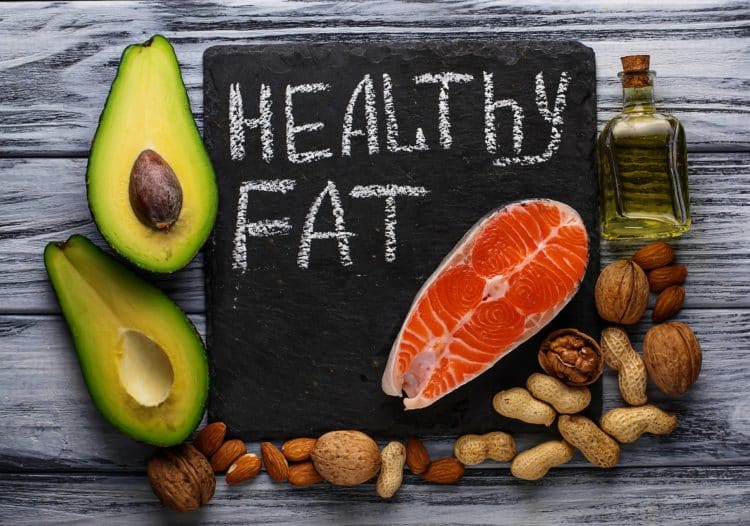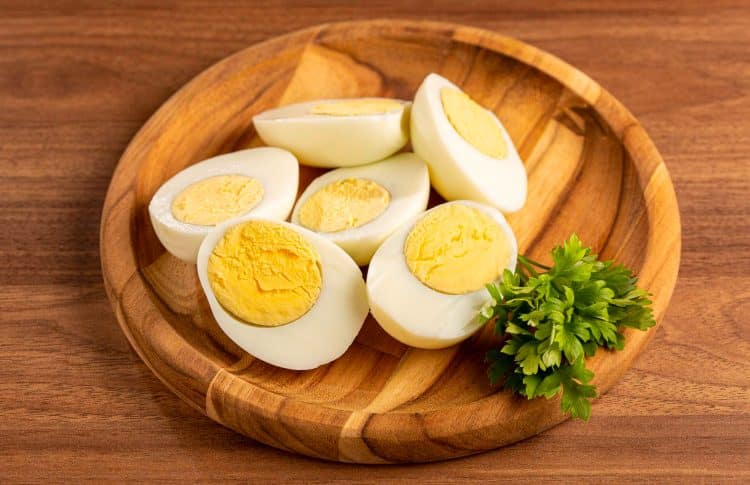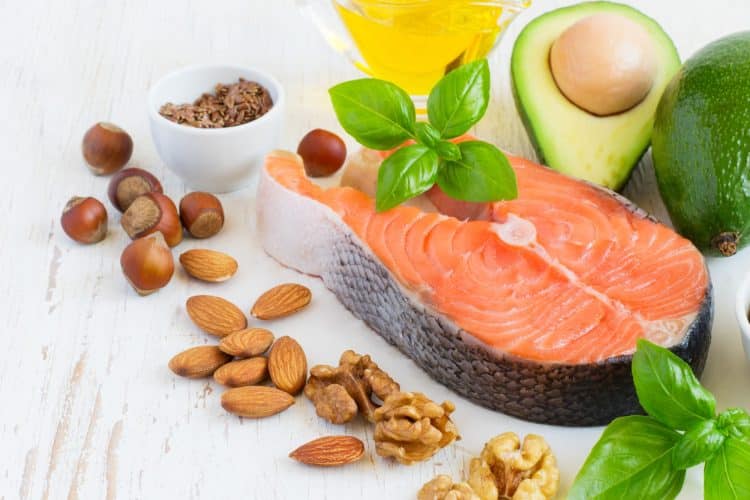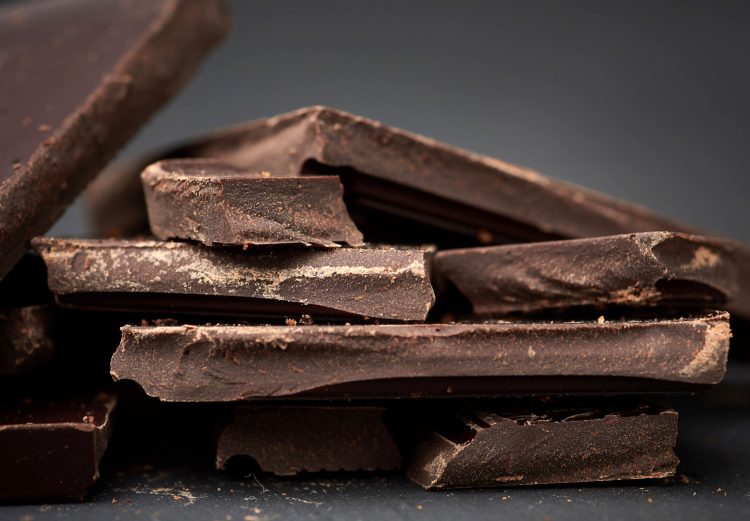Low-fat diets can lead to hormonal imbalances and weight gain (1). Healthy fats are necessary for optimum hormonal balance and weight management.
For decades, low-fat diets reigned supreme in the weight loss industry. Low-fat products dominated the market shelves, from low-fat cookies and snacks to low-fat butter and cheese.
As an experienced nutritionist, I have seen firsthand how low-fat diets wreak havoc on hormonal balance. These hormones are crucial for weight management and overall health, as they are vital in hormone production and regulation.
Read on to learn about the relationship between fat intake and hormone balance. Get the best tips on how to add healthy fats to your diet to balance your hormones and boost weight loss.
Health Risks of Low-Fat Diets
From the 1970s till recently, public health campaigns and dietary guidelines in the United States advocated low-fat diets to promote weight loss and reduce the risk of heart disease. Half a century later, the obesity rates in the United States are higher than ever, and heart disease remains the leading cause of mortality in the United States (2).
Level Up Your Fitness: Join our 💪 strong community in Fitness Volt Newsletter. Get daily inspiration, expert-backed workouts, nutrition tips, the latest in strength sports, and the support you need to reach your goals. Subscribe for free!
Low-fat diets and hormone deficiency
When you go on a low-fat diet, your hormone production gets disrupted, as fat is a key ingredient in hormone synthesis. Sex hormones, including estrogen and testosterone, need fat and cholesterol for their production.
Let’s take estrogen as an example. Estrogen deficiency, especially in women, can lead to a host of health issues, including erratic periods, heart palpitations, insomnia, night sweats, and more. It can result in testosterone dominance, which further aggravates issues like hormonal acne. You may experience hair loss from the scalp but unwanted hair growth in other areas. Your skin, hair, and nails can all be affected in this scenario.
Another worrying issue is disrupted thyroid hormones, leading to weight gain, lethargy, joint pain, memory problems, and even depression.
Importance of Fats in Hormonal Health
Fat plays numerous roles in your body. It is a fuel source, providing energy to your system. Layers of body fat cushion and protect vital organs such as the heart, liver, and kidneys.
Hormone production
Hormones function as chemical messengers in your body. All the metabolic processes in your body are regulated by hormones. This includes your mood, skin health, bowel health, weight management, ovulation, sleep, and so on.
Cell membrane integrity
The membrane surrounding each cell in your body works as a protective barrier, enabling it to function properly. This cell membrane is mostly made up of fats or lipids. Its functions include signaling and communication with other cells in your body.
Cell membrane integrity can be compromised if there is not enough fat. This inhibits the cell’s ability to communicate with other cells and regulate processes within your system. There are many consequences, including the disruption of hormonal regulation.
Anti-inflammatory effects
Factors such as high stress levels, poor diet, lack of exercise, and inadequate sleep can all lead to chronic inflammation. This, in turn, can disrupt hormonal balance, wreaking havoc on your system.
Anti-inflammatory foods can help combat this issue. Fat sources with omega-3 fatty acids, including fatty fish, flaxseeds, and walnuts, have anti-inflammatory properties.

Absorption of fat-soluble vitamins:
Fat-soluble vitamins such as vitamins A, D, E, and K cannot be absorbed if you are deficient in dietary fat. You can end up with vitamin deficiencies, which in turn trigger hormonal imbalances.
Mood regulation
Fats are essential for synthesizing and functioning neurotransmitters like serotonin and dopamine. These neurotransmitters are known as ‘happy hormones’ as they contribute to our well-being and mood regulation. When our serotonin or dopamine levels rise, we feel happy and content.
Low-fat and low-protein diets rescue the production of these neurotransmitters, negatively impacting your mood and motivation. This can increase carb cravings. And if you indulge in carbs, your insulin levels rise and you may experience a rapid release from your brain’s serotonin store. This can temporarily improve your mood. However, this tends to trigger a cycle of cravings and depression.
Instead of eating more carbs and continuing the vicious cycle, you should eat healthy fats and proteins to boost serotonin production and stabilize mood.
Healthy Fats for Weight Management:
Dietary fat is not the same as stored body fat. Eating fat doesn’t necessarily make you fat — consuming too many calories does, irrespective of their source. Including healthy fats such as fatty fish, avocados, nuts, and seeds in your diet aids your weight management efforts.
Fats are highly satiating, meaning they help you feel fuller for longer. This reduces the chances of having unhealthy snacks between meals and enables you to stay on track with your weight loss goals.
Adding healthy fats to your diet supports metabolic health. Unlike carbs that spike your blood sugars and then crash just as drastically, fats offer steady, sustained energy for your daily activities and workouts. A healthy diet and regular workouts are key to attaining and managing your goal weight.
Dr Jason Fung, author of the book ‘The Obesity Code’ says:
“Obesity is not about calories or fat grams or exercise, but about hormones. When insulin levels run too high for too long, we develop “insulin resistance,” which can make us fat.”
Healthy Fats for Hormone Balance
For a diet with healthy fats, you should include foods high in polyunsaturated fats, monounsaturated fats, and lots of heart-healthy omega-3. Since these are high in calories, it’s vital to practice moderation.
Types of dietary fats:
- Monounsaturated fats are found in nuts, avocados, peanut butter, olive oil, etc.
- Polyunsaturated fats are present in fatty fish, flaxseeds, walnuts, soybeans, etc.
- Saturated fats are mainly found in dairy products such as butter and cheese, animal fats, and coconut oil. There is no doubt that these foods are great for your health. However, there is still some debate regarding the link between saturated fat, high cholesterol, and heart disease. Hence, the American Heart Association recommends limiting the intake of saturated fats. So, practice moderation and add them to your diet in small quantities.
- Trans fats are created by adding hydrogen to vegetable oils to make them more solid and stable at room temperature. Trans fats raise your “bad” cholesterol” (LDL) levels while lowering the “good” cholesterol (HDL) levels. Trans fat is linked to an increased risk of heart disease and other cardiovascular complications. Processed and packaged foods high in trans fats or hydrogenated fats are quite unhealthy and should be avoided as much as possible.
Dr. Fungs recommends having:
“Natural, unprocessed fats include olive oil, butter, coconut oil, beef tallow, and leaf lard.”
Get Fitter, FasterLevel Up Your Fitness: Join our 💪 strong community in Fitness Volt Newsletter. Get daily inspiration, expert-backed workouts, nutrition tips, the latest in strength sports, and the support you need to reach your goals. Subscribe for free!
Top 10 Healthy Fat Sources
Here’s a quick look at the top 10 healthy fat sources to include in your diet for achieving hormone balance and maintaining a healthy weight. These foods are highly nutritious and offer various other essential nutrients.
1. Avocado
Regular intake of avocados is associated with increased satiety, improved weight loss, and reduced abdominal fat (3). Avocados are rich in monounsaturated fats, especially oleic acid. They are also high in fiber, thus promoting gut motility and digestive health.
Avocados offer numerous essential vitamins and minerals such as potassium, vitamin K, folate, and vitamin E. They contain potent antioxidants such as lutein, α-Carotene, and β-Carotene.
2. Fatty fish
Fatty fish such as salmon, mackerel, and sardines are rich in omega-3s. They contain the fatty acids docosahexaenoic acid (DHA) and eicosapentaenoic acid, which are crucial for brain and heart health.
Fatty fish are excellent sources of high-quality protein and essential nutrients such as vitamin D and selenium.
3. Full-fat dairy
You can get healthy fats from dairy products such as yogurt, cheese, and milk. They also contain many essential nutrients, including calcium, vitamin D, and vitamin K2.
Certain fatty acids in dairy fat, such as conjugated linoleic acid (CLA), offer heart-protective benefits (4).
4. Nuts and seeds
Walnuts, almonds, chia seeds, and flaxseeds are excellent sources of healthy fats. They are high in omega-3 fatty acids, which help reduce inflammation and support hormone regulation.
Nuts and seeds are also rich in protein and essential minerals like magnesium and zinc.
5. Nut butters
Nut butters such as almond butter and peanut butter offer delicious options for adding healthy fats and protein to your diet. They contain both monounsaturated and polyunsaturated fats.
Their combination of fats and fiber boosts satiety and helps stabilize your blood sugar levels. You can also get other essential nutrients like vitamin E and magnesium from nut butter.
6. Eggs
Eggs are among the most nutritious foods on this planet. Their saturated fat levels are relatively low compared to other sources of saturated fat.
Eggs also contain monounsaturated fats and polyunsaturated fats, including omega-3 fatty acids. They are rich in high-quality protein and offer a wide range of vitamins and minerals.

7. Coconut oil
Coconut oil contains medium-chain triglycerides (MCTs). This type of fat is rapidly metabolized by the body and offers quick energy for physical activities. For this reason, coconut oil is often added to pre-workout smoothies.
A bullet-proof coffee with some coconut oil or MCT oil is a great way to jumpstart your day, especially if you are on a keto diet. Coconut oil exhibits antimicrobial and anti-inflammatory properties. It also contains antioxidants that support your overall health.
8. Olives
Add olives to your diet to get more heart-healthy monounsaturated fats. Olives and extra virgin olive oil are rich in oleic acid, a type of monounsaturated fatty acid (5). This has been found to promote cardiovascular health by lowering cholesterol and reducing inflammation. Olives also contain vitamin E and polyphenols, which have antioxidant properties.
9. Grass-fed beef
Grass-fed beef tends to have a healthier fat profile. It has higher levels of omega-3 fatty acids and CLA. Beef contains essential nutrients such as iron, zinc, vitamin B12, vitamin B6, niacin, phosphorus, and selenium.
Beef is an excellent source of high-quality protein. It is one of the best food sources of vitamin B12 and heme iron. This is a more bioavailable form of iron than the non-heme iron found in plant-based foods.
However, you should limit your consumption of beef, especially the fattier cuts. Considering its saturated fat content, it’s best to aim for two to three servings a week.
10. Dark chocolate
Chocolate is a delicious way to add some healthy fats to your diet. However, you need to have dark chocolate with a high cocoa content. You can start with 50% cocoa content and then move to 70% or more dark chocolate.
And Dr. Jason Fung agrees:
“Dark chocolate with more than 70 percent cacao, in moderation, is a surprisingly healthy treat.”
You can add dark chocolate to your smoothies or sprinkle shavings over healthy desserts, oats, etc. Add dry fruits and nuts to some melted chocolate, pour spoonfuls on a baking sheet, and refrigerate till hard. You can pop one of these into your mouth when you crave something sweet.
Conclusion
Low-fat diets can trigger hormonal imbalances, leading to problems such as weight gain and mood swings. A balanced diet with good dietary fats helps balance hormones and support weight management. This can improve sleep, boost energy levels, and reduce unhealthy food cravings.
By eating a variety of healthy fats in moderation, you can enjoy their benefits without gaining unwanted weight. You can get healthy fats from avocados, fatty fish, nuts, seeds, olive oil, etc. These foods also contain nutrients such as omega-3 fatty acids, vitamin E, etc., which have anti-inflammatory and antioxidant properties and anti-aging benefits.
References:
- Ingram, D. M., Bennett, F. C., Willcox, D., & de Klerk, N. (1987). “Effect of low-fat diet on female sex hormone levels.” Journal of the National Cancer Institute, 79(6), 1225-1229.
- Hruby, A., & Hu, F. B. (2015). “The Epidemiology of Obesity: A Big Picture.” Pharmacoeconomics, 33(7), 673–689.
- Heskey, C., Oda, K., & Sabaté, J. (2019). “Avocado Intake, and Longitudinal Weight and Body Mass Index Changes in an Adult Cohort.” Nutrients, 11(3), 691.
- Hartigh, L. J. (2019). “Conjugated Linoleic Acid Effects on Cancer, Obesity, and Atherosclerosis: A Review of Pre-Clinical and Human Trials with Current Perspectives.” Nutrients, 11(2), 370.
- Lu Yan, et al. (2024). “Protective effects of oleic acid and polyphenols in extra virgin olive oil on cardiovascular diseases.” Food Science and Human Wellness, 13(2), 529-540.












